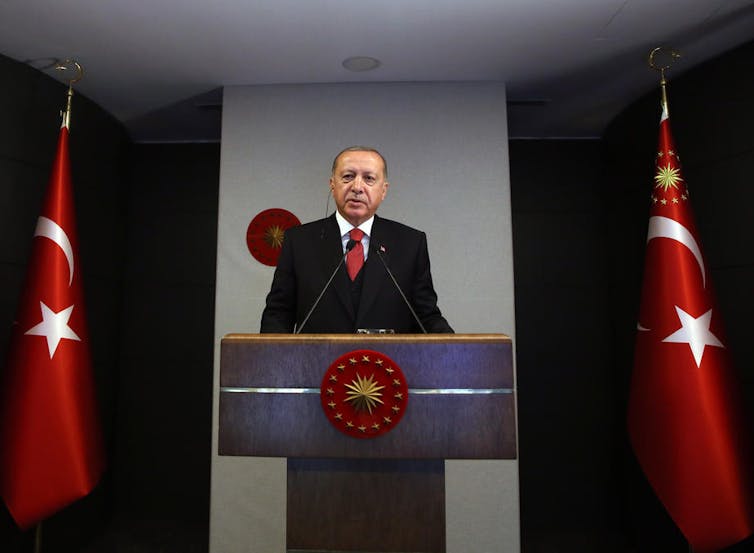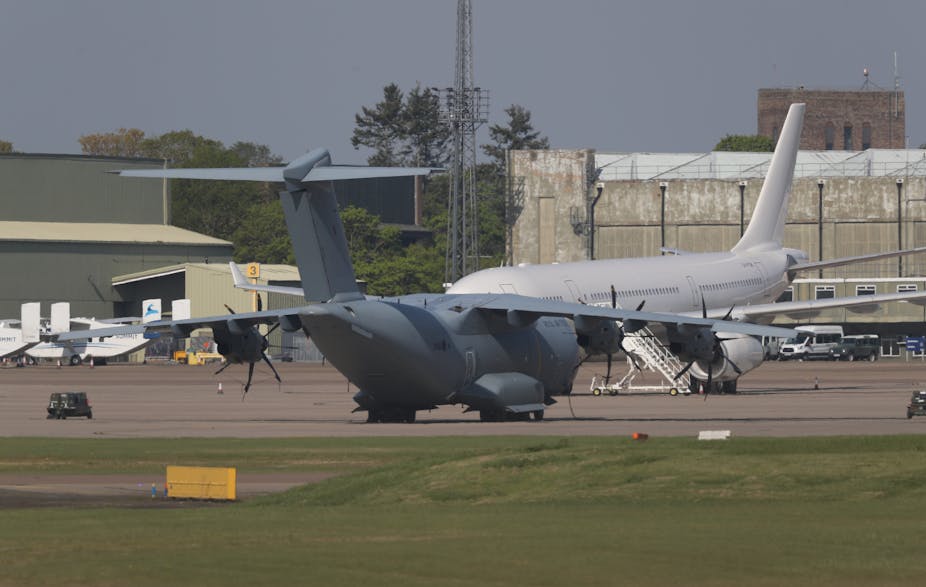Amid a global rush to find medical equipment for healthcare workers on the front lines of the coronavirus pandemic, the UK has ordered 84 tonnes of personal protective equipment (PPE) from Turkey.
But, for no apparent reason, the shipment was delayed, amid mounting controversy over the UK’s dependence on international suppliers for protective equipment. At least part of the shipment did eventually arrive on a plane from Turkey on April 22.
Turkey has also sent out medical supplies prepared by its Ministry of Defence in the form of aid to nearly 30 countries across the globe, including the UK, Italy and Spain.
Meanwhile, Turkey is struggling with its own coronavirus health crisis and possible shortage of PPE. As of April 22, the country had reported 95,591 cases of COVID-19 and 2,259 deaths, according to data collated by John Hopkins University.
The Turkish Medical Association has warned of problems surrounding the availability of PPE and conveyed fears among healthcare workers that they may run out of equipment. Turkey’s president, Recep Tayyip Erdoğan, was criticised by the head of the opposition Good Party, which questioned aid to Italy and Spain at a time when the Turkish government was asking for donations from citizens to help combat the disease at home.
Despite these questions, Turkey has continued to ship PPE to other countries. Ankara may be trying to boost its manufacturing sector and its economy during the pandemic. But there are also a deeper historical and political reasons behind this recent generosity.
Status through compassion
Before the pandemic began, Turkey was stuck in a complex crisis with political, economic and international dimensions. The main foreign and domestic policy agenda was the imbroglio in Syria and ongoing battle over Idlib. At home, Erdoğan’s ruling Justice and Development Party had lost municipal elections in Istanbul and Ankara in 2019 and the economy had been under stress at least since the 2018 exchange rate fluctuation.
But with the pandemic these crises have been all but forgotten. The new global agenda gave a rare opportunity to Erdoğan’s government to promote its strength at home and reconcile its image abroad.
The logo of the Turkish presidency was attached to the boxes, indicating the significance of this move for Erdoğan’s image. Some of the aid packages also contained a quote from the 13th-century Sufi mystic Mevlana Rumi – who is known for his peaceful Islamic teachings – linking the recent gesture to a long tradition of compassion in Islam.
The idea of mercy is important in Turkey’s collective identity – and the way the country thinks about itself. Epitomised in the words “peace at home, peace in the world” by the founder of the Turkish Republic, Mustafa Kemal Atatürk, benevolence sporadically surfaces in Turkey’s relations with other countries as a benign way to restore self-worth.
Drawing on Islamic thought, compassion can also be practised in international relations to redeem dignity and gain respect. In Islam, God is compassionate and kind – acts in his name should follow the same practice. Being a good Muslim is connected to sharing wealth, helping those who are in need and giving alms. Evoking these beliefs, Rumi’s quote on hope would strike a chord with many Turks who feel pride in helping others.
In the past two decades, under Erdoğan’s rule, Turkey has relied on similar sentiments to become a regional power in international relations, extending its influence in the Middle East and Africa. Craving higher status, Turkey has used global aid to increase its soft power in the Muslim world and beyond. This aid has been distributed in particular to Muslim nations in need, through the Turkish Cooperation and Coordination Agency and Islamic NGOs, backed by the Directorate of Religious Affairs.
The new COVID-19 assistance to European countries and others combines this policy with a new kind of power politics. It is, in part, a peaceful attempt to restore Turkey’s status and image at a time when they were particularly tarnished by the situation in Syria.

A friend and an ally
Assistance to and cooperation with the UK also has special meaning. The UK has been a critical ally of Turkey in the past few years. When Erdoğan faced a military coup in July 2016, the British government was among the first to condemn it. The events surrounding the coup left an emotional imprint on Turkish politics and there is longstanding gratitude to those – like the UK – who stood by Erdoğan at a traumatic moment.
Seen from this angle, it’s unsurprising that Ankara would want to reciprocate in this time of distress. Tellingly, the cargo plane that carried aid to the UK on April 10 also delivered a personal letter from Erdoğan expressing solidarity with the UK and wishing the British prime minister, Boris Johnson, a speedy recovery.
The aid packages, and readiness to supply PPE, gives Turkey an opportunity to reconcile its battered global image while strengthening old alliances. This example of “reverse aid” from East to West also signifies economic and political opportunities for states seeking higher status and power.
Countries like Turkey may find they now have a chance to reinvent themselves in cooperation with the West. Using peaceful means to gain respect on the global stage would not only be beneficial for them but would also give hope for a brighter future in global politics.

